Salesforce Interview Process - Our Expert Guide
Unlock success in the Salesforce interview process with our expert guide. Navigate stages, timelines, and crucial questions confidently.
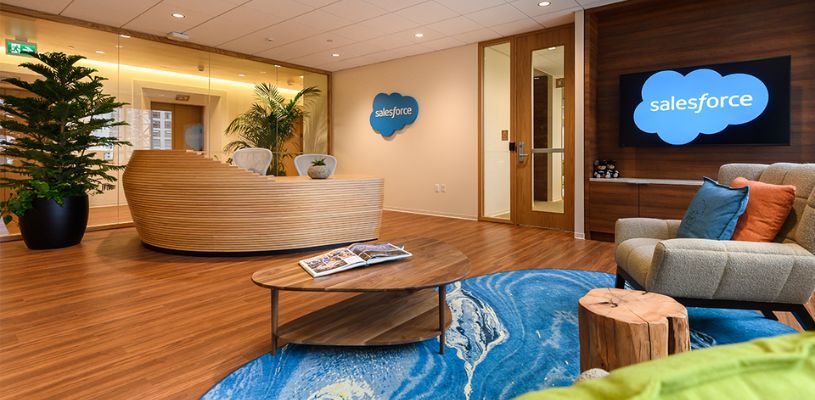
Salesforce is a leading cloud-based software company that provides businesses with customer relationship management (CRM) software and tools for marketing, analytics, ecommerce, sales, and more.
At 4 Day Week, we are going to provide useful tips and insights to help professionals and online job seekers land a job at top companies. We will share all the information you need to get a headstart in your Salesforce interview process.
Salesforce Hiring Process Overview
The Salesforce hiring process usually starts with a referral or when someone submits an online application which you can access by visiting the Salesforce Career Page.
On average, the Salesforce job interview can last 3 - 5 weeks, the process of which will be discussed in detail below.
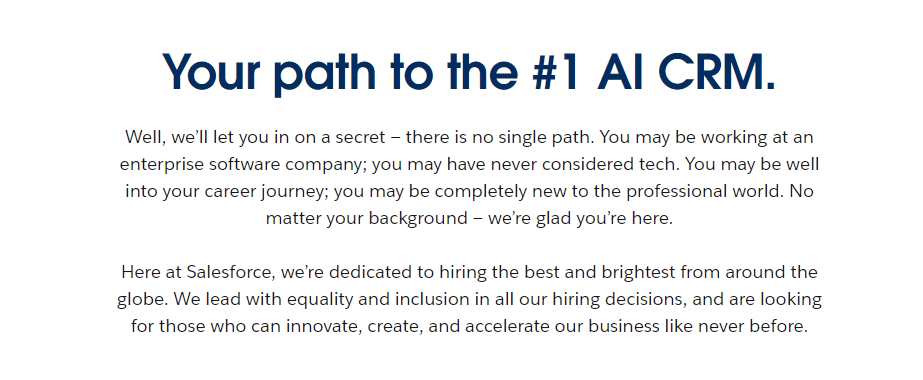
Here’s what Salesforce Interviewees Say
Based on the most recent data from Glassdoor, 81% of job applicants experience a positive interaction when interviewing for a job at Salesforce, which is a bit higher than the average.

This comes despite their 3.2 difficulty rating, which is slightly above average.
Much of the positive feedback from applicants revolves around Salesforce’s interviewers being competent, knowledgeable, cordial, and helpful.
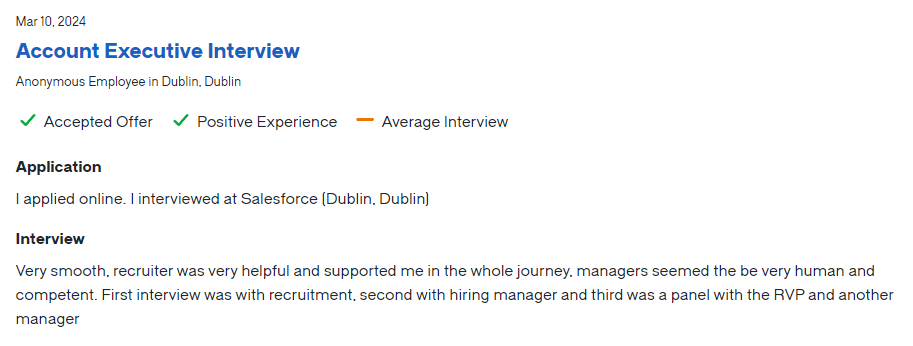
Salesforce Interview Process Timeline
From the moment you submit your job application online, the entire Salesforce application and interview process typically takes 3 to 5 weeks. That’s an average duration of 34 days.
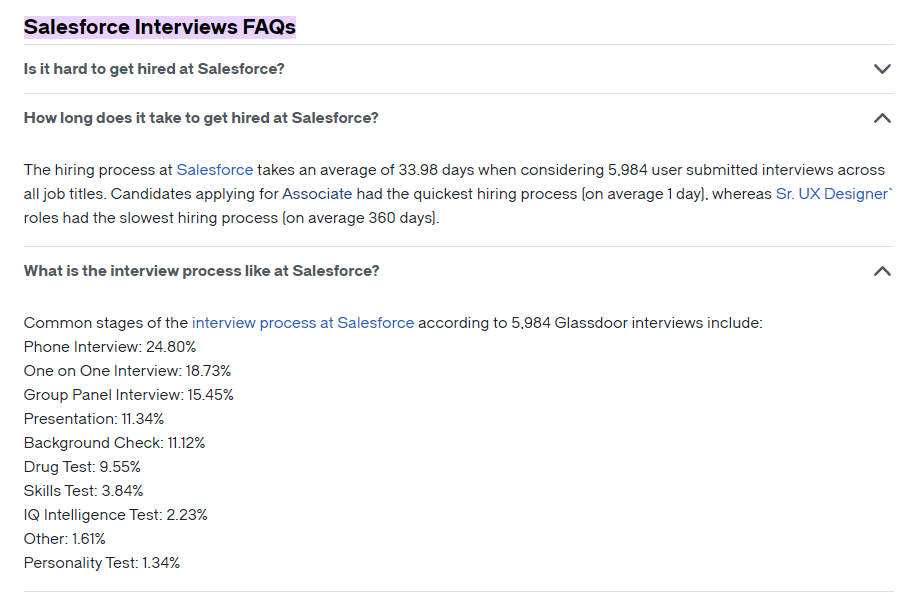
Disclaimer: The exact timeline, focus, and interview format of the job interview process at Salesforce varies and will highly depend on the role you are applying for.
Nonetheless, according to the company website, the Salesforce interview typically follows these 4 steps after you have submitted an online application:
1. Phone Screening: This is where a Salesforce recruiter conducts a short phone interview to discuss your background, qualifications, and more.
2. Hiring Manager Interview: A 1-on-1 interview with a hiring manager to assess if you are a suitable fit for the company.
3. Technical Interview: This is a role-specific interview stage conducted by the team or department of the specific role you are applying for, eg Sales department.
4. Final Interview: The final interview after which the company will decide whether to give you the job.
Detailed Salesforce Interview Stages
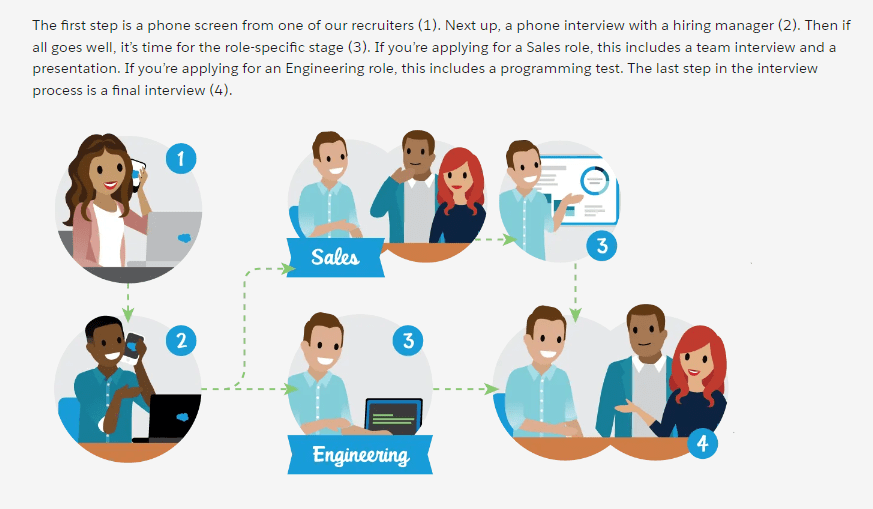
The Salesforce interview process typically consists of four stages. Each stage helps the company assess if you are the most suitable candidate for the company and the role you have applied.
Here's a detailed breakdown of the entire Salesforce interview process:
Stage 1: Phone Screening
Once you submit your job application online, Salesforce's applicant tracking system (ATS) will log your information and forward it to the company's recruiters team.
Once they find a role that matches your skills and qualifications, a Salesforce representative will schedule a call and set up a phone screening with a recruiter.
During this phone interview, the recruiters will try to learn more about your skills and experience.
You should also expect to answer questions regarding your employment background as well as questions about Salesforce.
Stage 2: Hiring Manager Interview
After the phone screening, you’ll have a 1-on-1 interview with one of the Salesforce hiring managers.
Questions at this stage focus on assessing your interpersonal skills and your alignment with the company's values. They might also ask you about your previous work experience, especially regarding the challenges you faced, and how you overcame them.
If you can answer competency-based questions well, you’ll be more likely to advance to the next stage of this interview.
These questions often sound something like, “Describe a time when…” and “Share an example of a time when…” We’ll cover more of those later.
During this stage, the interviewer will also discuss your career goals, long-term vision, and other relevant topics.
Would you like a 4 day work week?
Stage 3: Technical Interview
This is the technical assessment and role-specific stage of the Salesforce interview process.
Here, you will be given various tasks that will allow you to showcase your skills and qualifications for the role.
For example, if you are applying for a role in the Sales or Marketing Department, you might be subjected to a team interview and a presentation.
Meanwhile, if you’re applying for a role in the Engineering department, you might complete a programming test.
It shows that you better bring your A-game and be prepared for all the role-related tests the interviewers might throw your way.
PS. Depending on the role you are applying for on Salesforce, you might also be required to complete a HackerRank challenge; a three-hour test where you are provided with a problem statement and a series of questions to answer.
Stage 4: Final Interview
After completing all stages of the Salesforce interview process, they will call you in for a final interview.
During the interview, the hiring team will evaluate your overall performance and suitability for the role. The questions will focus on whether you would be a good fit at Salesforce.
If they find you to be a suitable candidate, you'll likely receive a formal job offer at the end.
To ensure that you obtain the best salary and benefits for the role you are applying for, aim to ace the Salesforce interview!
Best Tips to Ace the Salesforce Interview
Navigating the Salesforce interview process requires a blend of technical savvy and soft skills that resonate with Salesforce's collaborative culture. Let's explore how you can demonstrate your proficiency and align with their values to make a strong impression
1. Research Salesforce
Understanding the company's culture, goals, and services will enable you to tailor your responses and demonstrate your alignment with Salesforce’s mission.
For starters, visit Salesforce’s Candidate Resources Page and YouTube Channel. Learn about their CRM and other tools offered by Salesforce and how they were able to help their customers.
Thorough research will also ensure that you can answer as many questions about the company should it arise during our interview.
2. Read the job description carefully
Understanding and reading the job description carefully will help you better understand if you possess the qualifications for the role.
Applying only for the role that suits your skills and experience increases your chances of getting the job.
3. Practice and polish your technical skills
Whatever role you are applying for at Salesforce, take the time to practice and polish the skills required for the position.
This will ensure that you succeed in whatever role-related test the interviewers will give you during your actual technical interview.
For example, when given a particular test, find the best way to solve it. Remember to support your answers with specific examples from your past work experiences.
At this point, you can also discuss how your skills align with the job requirements and how you can contribute to Salesforce's goals.
4. Practice mock interviews regularly
As the saying goes: Practice makes perfect. By having regular mock interviews among friends, family, or professional networks, you will be able to hone your skills in how to answer questions convincingly and properly.
Make sure you try out the STAR interview framework while you practice, it will help you discuss your core competencies more effectively during the interview.
Moreover, mock interviews allow you to collect feedback from other people regarding your body language and the quality of your responses. Feedback will allow you to improve on areas that you struggle with.
A good place to start would be to prepare answers for typical questions like "Tell me about yourself" or "What are your strengths and weaknesses?"
5. Look and act the part
First impressions last. Hence, make sure that you dress professionally during your interview. You don’t have to wear or shop for new expensive clothes to achieve this.
You can simply wear something appropriate for the position you are applying for, ensure that your overall appearance is neat, smile, and maintain good eye contact with your interviewer.
In case you are interviewing through a webcam, check that your audio, video, and Internet connection are working properly before your interview. A clutter-free background is also highly ideal.
6. Follow up and show gratitude
After each Salesforce interview stage, send an email asking about the next steps of the interview process as this shows enthusiasm and a positive attitude.
When the entire process has concluded, go the extra mile by sending an email thanking Salesforce for allowing you to partake in their job hiring process.
Remind yourself that not all applicants are awarded a chance at an interview. It is never a loss to express gratitude whenever we can.
15 Common Salesforce Interview Questions
- What does Salesforce do?
- What are the features of Salesforce?
- How is Salesforce used by our customers?
- What are the benefits of using Salesforce CRM?
- What does CRM mean?
- What is a custom object in Salesforce?
- What is meant by an App in Salesforce?
- How can you lose data in Salesforce?
- Do you have any experience using Salesforce?
- How is SaaS beneficial to Salesforce?
- How many types of relationships are offered by Salesforce.com?
- Why are you the ideal candidate for this role in Salesforce?
- Describe your experience generating insights from data.
- Would you rather work independently or as part of a team?
- Why did you decide to apply for Salesforce?
Wrapping Up
Considering the company's reputation, landing a job at Salesforce can be a tall order. But with this in-depth guide on what to expect during the Salesforce interview process, we hope you’ve gained useful insights on increasing your chance of getting hired in the role you will be applying for.
We wish you the best of luck and if you’re keen on exploring career opportunities that promote a healthy work-life balance, visit 4 Day Week and discover a massive list of various remote jobs that offer the time freedom, and flexibility you seek.